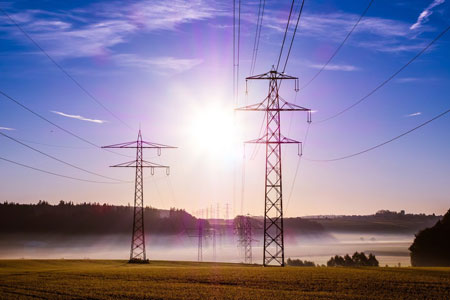 125th Anniversary
125th Anniversary
The Penn State's College of Earth and Mineral Sciences has a rich history dating back more than a century, from the original focus on mining engineering, to today's interdisciplinary focus on earth, energy, and materials sciences and engineering. The college was formed in 1896, and we are embarking on a yearlong celebration in 2021 of our upcoming 125th anniversary. The college will be hosting numerous celebratory events to commemorate this milestone.
Upcoming Events
- June 25: Village Lecture Series: Conversations with Colleagues Speaker: Bill Brune Talk: "Lightning Induced Chemistry in Atmospheric Science"
- June: GEMS 125th Anniversary Educational Series Speaker: Clive Randall, director of the Materials Research Institute. Talk: "Commercialization of Cold Sintering of Ceramics"
- July 28: Pioneers in Remote and Online Education Speaker: Jane Suttelin and Maria Wherley Talk: "How Technology and Learning Science Can Change Your Teaching"
- August: GEMS 125th Anniversary Educational Series Speaker: James Kasting, Evan Pugh University Professor of Geosciences (tentative) Talk: "The Search for Life on Planets Around Other Stars"
- Ryan Family Student Center Welcome Home Event will be held in conjunction with Homecoming annual parade watching gathering
- October 29-30: “Carbon: From Fuels to Materials” - 125th Anniversary Symposium A series of invited lectures, primarily by Penn State alumni, that illustrates the history, the progress and the synergism of fuels/materials connections with a view toward an even brighter future.
- October: Ryan Family Student Center Showcase Ribboncutting ceremony and open house for newly renovated center, will showcase expanded services, etc.
- October: Materials Research Institute Showcase Facilities will be open for guided tours.
- October: John and Willie Leone Family Department of Energy and Mineral Engineering’s 125th Anniversary Celebration Events will include a graduate student research showcase, facility tours, presentation of Hosler renovation plans, activities with student societies, and reception with the dean
- October: Joel N. Myers Weather Center Friday reception and Saturday breakfast/brunch
- October: Computational and Data Science in Earth Science 125th Anniversary Innovations in Education and Research Symposia Sponsored by the Institute for Computational and Data Sciences
- October 29-30: Celebration Weekend Recognition of 125th Fellows, poster sessions, tours of facilities, etc.
- October 30: Earth and Environmental Systems Institute Showcase and Reception Open house showing the renovated second floor and sharing of plans for third floor JEWEL renovation
Previous Events
- May 19: Panel - "Getting to Negative: strategies, ethics, and co-benefits of carbon capture and sequestration" Panel was part of IEE's Energy Days.
- April 20: GEMS 125th Anniversary Educational Series (virtual webinar) Speaker: Tim White, research professor and director of the EMS Sustainability Council
- April 15: 125th EMS Anniversary Steidle Café Speakers: Amit Das, State-of-the-Art; Long-Qing Chen, MatSE; George Kotsoni, doctoral candidate.
- April 14-15: "Reflections and Future Perspectives of Polymer Science in EMS" (virtual event) Series of lectures by both Penn State and non-Penn State faculty and keynote and plenary speakers, Geoffrey Coates and Thomas Epps III
- April 14: Department of Meteorology and Atmospheric Science's Hussey Lecture (virtual event) Speaker: Harry Campbell, Chesapeake Bay Foundation
- April 14-15: Celebration of Undergraduate Engagement (virtual event) Student presentations, workshops, and guest speakers highlighted undergraduate research and engagement experiences.
- April 11: Center for Energy Law and Policy and EME Joint Webinar Panel Discussion: "Planning for the Unplanned: Designing Resilience in Energy Systems"
- April 9: 2021 G. Albert Shoemaker Lecture in Mineral Engineering Speaker: Sustainability Officer - Freeport-McMoRan Americas Talk: “Meeting Escalating Stakeholder Expectations of the Mining Sector”
- March 26-27: EMEX - 125th Anniversary Century of Excellence Activity (virtual event) Earth and Mineral Sciences EXposition (EMEX) is the college's annual student-run open house
- March 25: Center for Energy Law and Policy and EME Joint Webinar Panel Discussion: "Who Decides on Resilience for Energy Systems?"
- March 25: Village Lecture Series: Conversations with Colleagues Speaker: Erica Smithwick Talk: "Role of Wildlife on Ecosystem Function"
- March 18: 125th EMS Anniversary Steidle Café Speakers: Doug Wolfe, ARL; Trevor Clark, Materials Characterization Lab; Conghang Qu, doctoral candidate.
- March 8: Center for Energy Law and Policy and EME Joint Webinar Panel Discussion: "What Messed With Texas, and Could it Happen Here?"
Seminar examines initiative’s effects on energy costs, power grid
P ennsylvania is set to join the Regional Greenhouse Gas Initiative (RGGI), a multistate compact to reduce greenhouse gas emissions from the electric power grid. The Commonwealth hosts one of the largest and most diverse power generation fleets in the country, and its decision to join RGGI will affect electricity provision across many states in the region. Joel Landry, assistant professor of environmental and energy economics in the John and Willie Leone Family Department of Energy and Mineral Engineering, discussed the effects of joining RGGI on energy costs and the power grid on October 2, 2020.
ennsylvania is set to join the Regional Greenhouse Gas Initiative (RGGI), a multistate compact to reduce greenhouse gas emissions from the electric power grid. The Commonwealth hosts one of the largest and most diverse power generation fleets in the country, and its decision to join RGGI will affect electricity provision across many states in the region. Joel Landry, assistant professor of environmental and energy economics in the John and Willie Leone Family Department of Energy and Mineral Engineering, discussed the effects of joining RGGI on energy costs and the power grid on October 2, 2020.
Landry’s talk covered topics such as how RGGI works, the impact of the RGGI carbon price on power grid operations, and its effectiveness at reducing greenhouse gas emissions and other pollutants from power plants.
Landry’s talk is part of the Regional Greenhouse Gas Initiative seminar series hosted by Penn State’s Center for Energy Law and Policy. The center is a University-wide initiative that supports independent and interdisciplinary research, education, and stakeholder engagement on complex energy issues. It provides thought leadership on energy issues where emerging science and technology are intertwined with legal, economic, and social institutions. For more information on the Center for Energy Law and Policy, contact Seth Blumsack, center director, at sab51@psu.edu.
EESI EarthTalks panel to focus on energy education in post-pandemic world

The current coronavirus pandemic caused (dramatic) volatility in the price of oil to drop and education to happen remotely. How should institutions like the College of Earth and Mineral Sciences, which offers degree programs in petroleum and natural gas engineering as well as renewable energy and climate, adapt? Susan Brantley, director of the Earth and Environmental System Institute, and Lee Kump, John Leone Dean in the College of Earth and Mineral Sciences, led a panel discussion on the future of energy education.
Panelists included Jennifer Baka, assistant professor of geography; Seth Blumsack, professor of energy policy and economics and international affairs; Mike Loudin, former head of geoscience workforce development at ExxonMobil; Kevin Smith, CEO for the Americas, Lightsource BP; and Sanjay Srinivasan, head, John and Willie Leone Family Department of Energy and Mineral Engineering.
The panel was held on May 18, 2020. The talk was free and open to the public.
The energy panel was part of the spring 2020 EESI EarthTalks series, "Societal Problems, EESI Science towards Solutions." The series featured scientists from Penn State’s Earth and Environmental Systems Institute (EESI) and explored the human impacts on the global environment and how to apply this knowledge to decision-making.
Energy forum engages Penn State community
A series of energy forums is being held to discuss how Penn State can continue to strengthen its position as an energy leader. The first forum took place on December 11. The virtual event was titled “Energy University: Concept and Current Activities.” Penn State faculty, staff, and students were invited to participate.
The forum featured an Energy University overview from Penn State President Eric Barron. He discussed the status of Energy University and introduced areas that the University will focus on for growth and investment.
"Universities have an obligation to the people and the communities they serve to create a better tomorrow,” Barron said. “In the case of energy, we need solutions that will provide sources that are clean, abundant, safe, and affordable. At Penn State, we take this challenge very seriously, from the solar energy that will provide more than 25 percent of Penn State’s purchased electricity over the next twenty-five years, to the education and support that the University provides through Penn State Extension and beyond. The demand for energy is only increasing, and it’s imperative that universities lead the way through education, research, and implementation to show that it is not just reasonable, it is achievable."
The followed focal areas had short presentations:
- "Energy Transitions" was delivered by Seth Blumsack, director of the Center for Energy Law and Policy, who was introduced by Hari Osofsky, dean of Penn State Law and the School of International Affairs.
- "Developing Solutions" was delivered by Bruce Logan, director of the Consortium for Integrated Energy Systems, who was introduced by Lee Kump, dean of the College of Earth and Mineral Sciences.
- "Strengthening Communities" was delivered by Esther Obonyo, director of the Global Building Network, who was introduced by Marie Hardin, dean of the Donald P. Bellisario College of Communications.
- "Advancing Literacy and Leadership" was delivered by Rachel Brennan, director of the Drawdown Scholars Program, who was introduced by Justin Schwartz, dean of the College of Engineering.
Lora Weiss, senior vice president for Research, moderated a panel that focused on big ideas for Energy University. The panel discussion explored the opportunities and impacts that Penn State can have in energy.
“For Penn State to bolster its impact as an energy leader, we must use the resources, talent, and creativity within our research enterprise,” Weiss said. “The University’s extensive knowledge in all aspects related to energy is found within our world-renowned energy researchers and facilities that house some of the most advanced research equipment in the world; we have a responsibility to explore and advance research directions that can be translated into real-world improvements.”
Finally, Tom Richard, director of the Institutes of Energy and the Environment, moderated an open discussion where attendees could share their feedback and input on Energy University.
“Energy is central to nearly every aspect of our lives, from housing and transportation to food, manufacturing, education, and health,” Richard said. “The full depth and breadth of disciplines from across Penn State are critical in this era of rapid energy transitions. I look forward to this dialogue about how we can work together to achieve our Energy University ambition.”
Seminar examines Regional Greenhouse Gas Initiative amid state energy policy
 The Regional Greenhouse Gas Initiative (RGGI), aimed at reducing greenhouse gas emissions from the electric power sector, will change Pennsylvania’s energy landscape, but it will not be the only major element of the Commonwealth’s energy policy. Daniel Mallinson, assistant professor of public policy and administration at Penn State Harrisburg, and graduate student Andrew Bell discussed how RGGI might interact with Pennsylvania’s Alternative Energy Portfolio Standard and Act 129 on December 4, 2020.
The Regional Greenhouse Gas Initiative (RGGI), aimed at reducing greenhouse gas emissions from the electric power sector, will change Pennsylvania’s energy landscape, but it will not be the only major element of the Commonwealth’s energy policy. Daniel Mallinson, assistant professor of public policy and administration at Penn State Harrisburg, and graduate student Andrew Bell discussed how RGGI might interact with Pennsylvania’s Alternative Energy Portfolio Standard and Act 129 on December 4, 2020.
The talk also covered topics such as reinvesting revenues generated by RGGI and ideas for leveraging these revenues to encourage equitable energy innovation for the post-COVID-19 economic recovery in Pennsylvania.
The seminar, which was free and open to the public, was held through Zoom.
Mallinson’s talk is part of the Regional Greenhouse Gas Initiative seminar series hosted by Penn State’s Center for Energy Law and Policy. The center is a University-wide initiative that supports independent and interdisciplinary research, education and stakeholder engagement on complex energy issues. It provides thought leadership on energy issues where emerging science and technology are intertwined with legal, economic, and social institutions. For more information on the Center for Energy Law and Policy, please contact Seth Blumsack, center director, at sab51@psu.edu.


